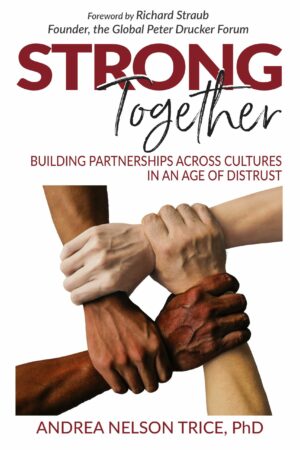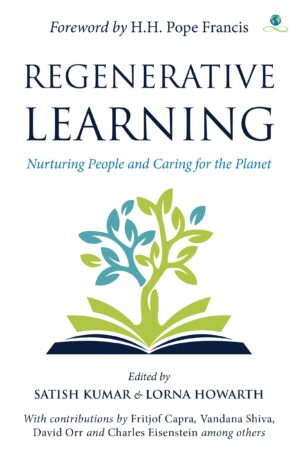Today, few relationships are personal.
Instead, we are linked en masse through vast, complex networks (financial, political, social, digital).
The shape and rules of engagement of those networks exerts a powerful influence on our behaviour as governments, as companies, as NGOs, and as individuals.
At the same time, these networks seem to be beyond the possibility of being influenced let alone controlled by governments, by other individual companies, by the media, by NGOs, or by us as individuals.
The major challenge facing us is not about ethics.
Rather, the major challenge facing us is to design companies, markets and government in such a way that the pursuit of wealth, of justice, and of sustainability do not continue to remain in tension with each other.
Distributed worldwide by Salt Desert Media Group Ltd.
Further information: Mr Prabhu Guptara, +44 (0)753 581 5179
prabhusguptara@gmail.com






Admin –
“This book is right on the money.
Socially responsible companies depend on policy makers, customers, regulators, and stakeholders evolving their approaches alongside them, to keep in step with the urgent societal challenges we all face. Working in partnership is the only way of delivering better outcomes in an increasingly complex, interdependent world.”
– Colin Skellett, Group Chief Executive, Wessex Water
“A fascinating book. For me the core sentence is “not approaching the human being directly but rewire national society through strategic and structural reforms”. It asks people to think very differently about the fundamental role of relationships in helping individuals and societies to flourish. It raises the question of whether it is necessary to address not only the relationships but, more importantly, the conditions in which they will thrive.”
– Professor Gillian Stamp MBE, Director, Bioss the Foundation
“The authors of this book develop the concept of human connectivity to bring us to a new level of understanding of how and why it is so important. Development of clusters of new technology companies, science parks and innovation centres, has demonstrated conclusively the importance of human connectivity for the development and success of technological innovation and transfer; it is sometimes more important than the technology itself.”
– Alan Barrell, Professor of Entrepreneurship, Cambridge Learning Gateway
“All aspects of life involve relationships and that includes the business world. Sadly, this is often forgotten not only by those involved in business but also by those criticising businesses or seeking to reform business laws and practices. The result is an impasse. This book offers us a possible way forward, not merely by suggesting solutions to particular issues, but by inviting us to look at the problem in a different way. It deserves to be widely read and considered.”
– Richard Godden, Partner, Linklaters LLP, U.K.
“The world is not what it used to be. One of the many reasons for this is the change of thinking in the corporate world that the shareholder had primacy of place amongst other stakeholders. In our resource constrained and climate changing world, corporate capitalism has changed from being exclusively in favour of the shareholder to inclusive, with the board taking account of the needs interests and expectations and concerns of stakeholders pertinent to the business. The board in discharging its duty of care to the company should always make a decision in the long-term best interests of the health of the company. This book helpfully analyses some of the history and current thinking on the development of the stakeholder-inclusive approach and how that can be achieved, and contributes to the debate on the purpose of a company. It also explores how the instability of corporate operations can be traced to a lack of human connectivity in the networks surrounding companies and which can be addressed in terms of mutual knowledge, alignments of interest and perceived fairness.”
– Professor Mervyn King SC
“Is Corporate Capitalism the Best We’ve Got to Offer? is a timely publication that raises some compelling questions about corporate capitalism: its role as a sustainable driver for the global economy’s growth, its place in a digitally-connected global market where a company can access its global customers at the click of a button, and its response to the growing demand for companies’ social responsibilities. By examining the web of complicated relational issues that companies operating in this hyper-connected era face, the authors offer an insightful analysis of the relational issues and practical suggestions as to how to strengthen companies’ relationships with their diverse stakeholders in order to enhance the sustainability of corporate capitalism.”
– Samuel Kwon, Chair of Global Practice, Lee & Ko, South Korea.
“Relational Thinking has the power to reshape the global economy. The global B Corp movement (on the demand side) and the Impact Investment movement (on the supply side) are putting relational thinking into action. This book is a timely call for all institutions systematically to apply this thinking so that we might accelerate the change – from a system of corporate capitalism that is destroying us, to a relational economic system that could restore and regenerate.”
– James Perry, Co-founder & board member of B Lab UK, part of the B Corporation movement
“Corporations are often viewed and experienced as faceless and soulless institutions. We tend to forget that these are actually social constructs, invented to more effectively and efficiently organise collective human endeavour and interaction. Corporations that do not recognise and nurture their human connections and interdependencies create structural instability, not only within themselves but for the capitalist economic system as a whole as is so well argued by the authors of this book. My hope is that the guidance in this book is heeded. Challenges such as climate change and inequality are clear indications that the current paradigm is not sustainable. Companies, especially global companies, have a responsibility to be responsive to these challenges and to shift from a singular focus on profit to corporate purpose which has a more inclusive vision of value creation.”
– Ansie Ramalho, Chairperson: King Committee for Corporate Governance in South Africa
“This work could not have come at a better time. It offers refreshing new perspectives on corporate capitalism that go far beyond established concerns with the current public mistrust in companies. In addition to shedding light on how stakeholder relationships influence and shape the way companies are run, the book reveals the myriad ways in which they shape how we understand and encounter the society and the world in which we live. The weakness in the relationships across these global networks is endemic. The suggested policy directions to promote mutual knowledge, alignment and fairness are indispensable.”
– Prof Arad Reisberg, Professor of Corporate Law and Finance, Head, Brunel Law School, U.K.
“A timely book in a business world where many companies are re-examining their purpose, and considering how to relate to all their stakeholders, not just their shareholders.”
– Barbara Ridpath, Non-Executive Director in financial services companies, and Chair of the Church of England’s Ethical Investment Advisory Group
“In this bracing challenge to traditional corporate governance, Lee, Rushworth and Schluter demonstrate that relational stability across all stakeholders is essential to long-term corporate health. Lest their recommendations for transforming corporate enterprise seem unrealistic, they give vivid examples of companies already putting each into action. Highly recommended, even for those of us who defend shareholder-oriented governance.”
– Professor David Skeel, S. Samuel Arsht Professor of Corporate Law at the University of Pennsylvania Law School.
“The thinking of company directors has moved on from being almost exclusively focussed on shareholders, to including the interests, expectations and concerns of all major stakeholders. This book takes us one step further in the journey by demonstrating that most corporate problems can be traced to weak human connectivity, internally or externally, and by offering practical steps corporate leaders can take to improve connectivity through mutual knowledge, alignment of interests, and raising the level of real as well as perceived fairness in their stakeholder relationships.”
– Peter Taylor, Chairman and CEO, TTP Group plc, U.K.